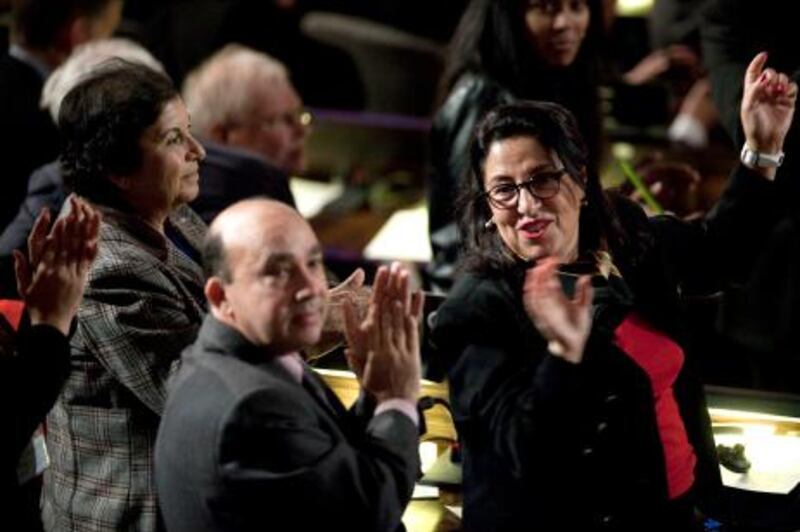Palestine took an symbolic step towards statehood yesterday when Unesco voted to award it full membership, prompting the US to announce it is ending its funding to the United Nations’ agency.
The UN’s educational, scientific and cultural organisation’s general assembly, meeting in Paris, gave full backing to the Palestinian application, with 107 of the 173 voting countries in favour. Only 14 were opposed, though 52 abstained.
Unesco - known for its World Heritage Sites - was the first UN body that Palestine had sought to join since its president, Mahmoud Abbas, applied for full UN membership on September 23. Success, despite the agency’s limited scope, amounts to a moral victory.
“This vote will erase a tiny part of the injustice done to the Palestinian people,” said Riyad Al Malki, Palestine’s foreign minister.
The cry “Vive la Palestine” was heard amid loud cheers from delegates as the vote was announced.
As well as giving Palestinian leaders the breakthrough in international recognition they had sought, it represented a willingness to resist the diplomatic and financial muscle of Israel and its supporters.
The US struggled to marshal opposition to the Palestinian case and, just hours after the vote, said it would stop financial contributions that amount to about one fifth of the agency’s budget. Under a law enacted in the 1990s, the US Congress opposes financial help for any UN body admitting Palestine to full membership.
“We were to have made a $60 million payment to UNESCO in November and we will not be making that payment,” State Department spokeswoman Victoria Nuland told reporters.
But Ms Nuland said the US would maintain membership in the body.
Canada and Germany also voted against and Britain abstained but supporters included the UAE and almost all Arab nations, Brazil, Russia, China, India, South Africa and France.
Israeli officials, angered by the vote but resigned to the outcome, immediately said Israel rejected the decision and would also now be reviewing its links with Unesco. This is likely to include freezing Israeli contributions, amounting to a further three per cent of the agency’s budget.
The Israeli foreign affairs ministry described the vote as “a unilateral Palestinian manoeuvre which will bring no change on the ground but further removes the possibility for a peace agreement”.
Even by applying for full membership, it said, the Palestine Authority was rejecting efforts by the international community to advance the peace process. “This decision will not turn the Palestinian Authority into an actual state yet places unnecessary burdens on the route to renewing negotiations. Israel believes that the correct and only way to make progress in the diplomatic process with the Palestinians is through direct negotiations without preconditions.”
Israel said it regretted the European Union’s failure to present a unified opposition to the Palestinian move and said it would now “consider its further steps and ongoing cooperation with the organisation”.
The US endorsed Israel’s view that peace negotiations would be adversely affected by Palestinian admission to Unesco.
“We think it’s counterproductive, it’s a premature step,” Martha Kanter, the US undersecretary for education, told the general assembly before the vote.
Unesco is now bracing itself for a financial crisis. The organisation’s director general, Irina Bokova, said last week she was concerned about the possible withdrawal of US funding. “This would have serious consequences, programmes would have to be cut, our budget would have to be rebalanced,” she told Agence Prance-Presse.
Ms Bokova, who described herself as neutral on the issue, added: “The US administration supports Unesco, but (the Americans) are trapped by laws adopted 20 years ago.“ In fact, the US previously boycotted Unesco for 19 years, because of “growing disparity between US foreign policy and Unesco goals”, before rejoining in 2003.
Yesterday’s vote is seen as a prelude to next week’s attempt by Palestine to gain membership of the UN General Assembly. This application, however, is doomed by the US power of veto which it has made clear it would use.
The Security Council will meet on 11 November. While supporting Palestinian membership of Unesco, the French president, Nicolas Sarkozy, has said full membership of the UN is premature. He favours non-member admission. He also wants a rigid timetable on the peace talks, with deadlines of six months to find an agreement on borders and security and a year to reach a definitive deal.
Speaking on the eve of the Unesco vote, Mr Al Malki, underlined the weight attached to the application, saying: “This success, if it is realised, and with this large number of votes, will give a great boost to the efforts that we are making to get the required vote in the United Nations.” The Palestinian Authority is now expected to call for world heritage status to be granted to sites and monuments in the occupied Palestinian territories.
okari@thenational.ae with additional reporting by Agence France-Presse






